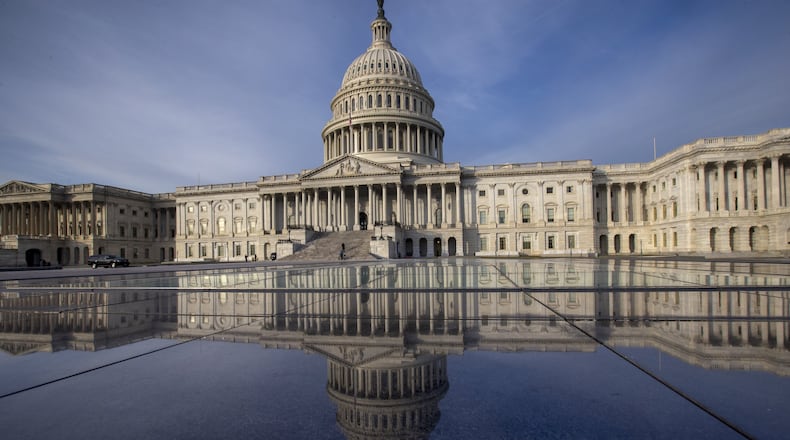Wright-Patterson is the largest single-site employer in Ohio with more than 27,000 employees — the vast majority of whom are civilians — and touts a regional economic impact greater than $4 billion.
RELATED: Temporary funding prevents shutdown but hurts military, officials say
Michael Gessel, vice president of the Dayton Development Coalition, said “it is increasingly difficult to predict what Congress will do and the predictions change almost on an hour-by-hour basis. There is similarly a very high level of uncertainty and we will not really know until the next few days what the chances are.”
“I know it grows tiresome to hear, but yes, the bickering and intransigence between the parties appears to be growing and making legislation more difficult,” Gessel added.
Prior to 2013, the most recent government shutdown was during a three-week period in 1995 and 1996.
Major fallout
The fallout from any shutdown damages national security, wastes money, and impacts employee morale, Gessel said.
Todd Harrison, director of defense budget analysis at the Center for Strategic and International Studies in Washington, predicted Congress will approve another temporary spending bill.
But in an e-mail Tuesday, he warned that a “shutdown remains a real possibility,” adding that “Congress will eventually get to a budget deal, but it may take a few more weeks or months.”
RELATED: Lack of defense budget raising concerns at Wright-Patterson
The National Museum of the U.S. Air Force, one of the state’s biggest tourist attractions, would close until a funding deal is reached, a spokesman has said.
Divided Congress
The two parties are squabbling over whether to increase defense spending, find money to build a wall or increase security along the Mexican border as demanded by Trump, and an insistence by Democrats that any spending measure provide legal guarantees for the children of undocumented immigrants, a program known as the Deferred Action for Child Arrivals, or DACA.
While there appears little appetite in the Senate to shut down the government, the House is deeply divided. With Medicare, Social Security and Medicaid shielded from potential reductions through a 2013 law aimed at controlling spending, lawmakers are arguing about how to spend roughly $1.1 trillion in what is known as discretionary spending — money Congress needs to appropriate every year.
A number of Republicans such as Sen. Rob Portman of Ohio and Rep. Mike Turner of Dayton are demanding more than the $549 billion for defense than is permitted under 2018 federal spending year guidelines. In return, Democrats want to spend more on domestic programs than the $516 billion allowed in 2018.
RELATED: Ohio fighter jet unit heads to Baltic region
In a conference call with Ohio reporters Tuesday, Portman said in a private meeting last week with Senate Republicans, Secretary of Defense Jim Mattis “painted a pretty dismal picture about our preparedness.”
“We do have a situation right now with more and more responsibilities overseas,” Portman said. “We have to have additional defense spending.”
Portman said he has talked to people at Wright-Patt who are concerned about a shutdown. “I think it is really important to figure out to move forward without a government shutdown,” he said.
No relationship building
Looming in the background is the concern about the impact a shutdown could have on this year’s congressional elections. With Trump’s popularity remaining around 40 percent in most polls, GOP analysts already fear they could lose the Senate and House in November.
Daniel R. Birdsong, a University of Dayton political science lecturer, predicted a shutdown is unlikely “because of the political question of who gets blamed for this.”
RELATED: State leaders tour Wright-Patterson as they explore how to protect bases
But Wright State University economics professor Evan Osborne said a shutdown is likely because he doesn’t expect Trump to budge on the “single most important” issue to his base: illegal immigration.
“He ran on ‘build the wall’” and curbing illegal immigration, Osborne said. “I don’t really see him giving on that.”
Adding to the unpredictability is the combativeness between Republicans and Democrats in Congress.
“There doesn’t seem to be a lot of relationship building between the Congress and the White House on big ticket items like immigration and tax reform,” Birdsong said.
In a sign that both parties are prepared to blame the other, Blaine Kelly, a spokesman for the Ohio Republican Party, took direct aim at Sen. Sherrod Brown, D-Ohio, saying Brown “would be wise not to hold military funding hostage, but instead support a common sense compromise to keep the government open.”
RELATED: Air Force pilot shortage growing, top leaders say
For his part Brown, who is seeking re-election to a third term in November, said “there is no reason for a government shutdown. Congress needs to come together and do its job.”
‘We follow a very deliberative process’
Military leaders — including at Wright-Patterson — tend to decry temporary spending measures. They say they lower combat readiness, prevent the start of new programs, cap spending at last year’s levels and don’t eliminate reductions under the Budget Control Act of 2011.
Wright-Patterson spokesman Daryl Mayer said the base has not received guidelines on who would be exempt from a furlough.
“We follow a very deliberative process and guidelines to determine what services, if any, would be suspended during any government shutdown,” he wrote in an email.
The last time the base shut down, active-duty military personnel stayed on the job.
Among civilians, exemptions were made for personnel involved with the protection of life or property, such as police, fire, medical services and airfield operations.
